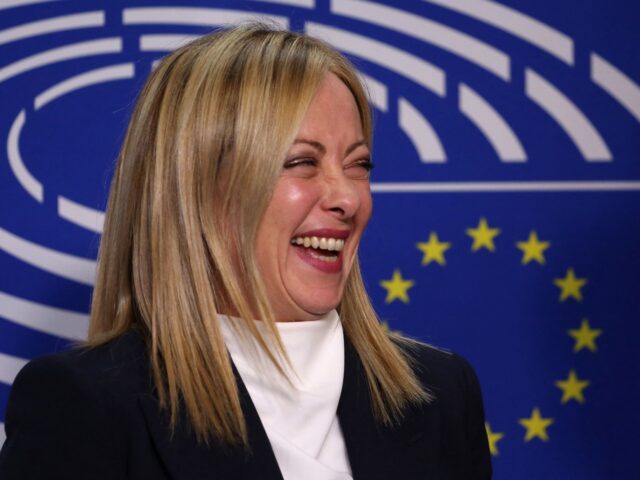Polling has projected populist and conservative-leaning blocs to make significant gains in the next European Union parliamentary elections, as support for centrist parties wanes in the wake of growing discontent over failures on immigration and the green agenda.
A review of national polling figures conducted by the POLITICO website has predicted that next June’s European elections will see the conservative European Conservatives and Reformists (ECR) and the populist Identity and Democracy (ID) groups pick up seats in the European Parliament, mostly at the expense of neo-liberal centrists.
The projections are based on the current 705 seat makeup of the parliament, however, the body is expected to expand next year to 720, meaning that there will likely be more seats up for grabs.
According to the analysis, the eurosceptic ECR would become the third largest faction in the parliament in Brussels with a 23-seat gain over the 2019 elections. Should the polling figures bear out, this would mean that the ECR would be on the same level as the globalist-oriented Renew bloc, which includes French President Emmanuel Macron’s Rennaisance party.
The surge of the anti-federalist conservative group would largely come on the back of a growth in support for the Brothers of Italy party of Prime Minister Giorgia Meloni, who despite coming into office just last year, has taken on a significant role in leading negotiations with African nations, particularly on the issue of the continued migrant crisis over the Mediterranean Sea.
Meanwhile, the populist Identity and Democracy (ID) group — initially formed by Italian Deputy Prime Minister Matteo Salvini — is on pace to pick up 17 seats in the parliament, taking their total to 77. The gains are expected to come from the increasing support for the Alternative for Germany (AfD) party, which has shocked the establishment in Berlin by rising to the second-strongest party in the country, surpassing the Social Democrats of Chancellor Olaf Scholz.
Populism is rising across Europe as concerns over mass migration mounthttps://t.co/diOIi761gD
— Kurt Zindulka (@KurtZindulka) July 12, 2023
Last month, the AfD selected Member of European Parliament (MEP) Maximilian Krah as the party’s lead candidate for next year’s elections. During his acceptance speech, Krah declared that the AfD is now “the most exciting right-wing party in all of Europe.”
The main issue driving the rise in popularity of the AfD has been mass migration, with net migration to the country hitting a record high of 1.5 million last year, largely driven by the war in Ukraine. However, hundreds of thousands of illegals continue to pour into the continent, straining already stretched resources. At their party conference last month, AfD co-chair Alice Weidel said: “We must build a fortress around Europe,” adding that the AfD will work “together with our European partners” to crack down on the crisis.
The cost of living crisis, which has also been heavily influenced by the war in Ukraine, demonstrated to many voters in Germany that the neo-liberal policies of former Chancellor Angela Merkel, namely pursuing so-called green energy forms while propping up the energy sector with Russian gas, was foolhardy.
The survey conducted by POLITICO demonstrated the growing discontent with the climate cultist agenda, with the Greens on pace to be the election’s biggest loser as current projections predict a loss of 24 seats. Perhaps sensing the growing public resentment against the foolhardy green policies, the more centrist European People’s Party (EPP) Group has become more willing to work with the conservative ECR to oppose Green Deal legislation.
Although the survey predicted that populists and conservatives are set to make the biggest gains, it will not likely be enough to fully flip the EU parliament, with the European People’s Party (EPP) set to remain the largest bloc at 165 seats, despite being predicted to lose 12 seats. The left-wing Socialists and Democrats (S&D) is expected to retain its position as the second-largest coalition at 145, picking up two.
While the elections for the European Parliament are not until June of next year, populists will have a chance to flex their muscles in national elections this autumn, including in Poland where the governing conservative Law and Justice party (PiS) of Prime Minister Mateusz Morawiecki will seek to fend off a challenge from the globalist Civic Coalition of former European Council President Donald Tusk.
Elections will also be held in The Netherlands, where the upstart Farmer Citizen Movement, born out of the tractor protests against the EU’s anti-farming agenda, will seek to upend the political establishment further in The Hague and derail the climate initiative of Brussels.
The Dutch insurgent populist Farmer-Citizen Movement (BBB) party dominated last week’s provincial elections to such a degree that it became the largest party in the country despite being outspent in media advertising by ten other parties. https://t.co/FmxiyCZqa9
— Breitbart News (@BreitbartNews) March 26, 2023

COMMENTS
Please let us know if you're having issues with commenting.